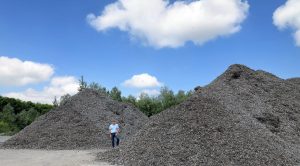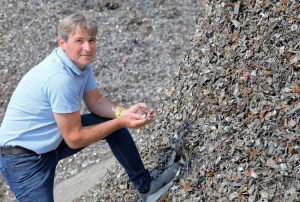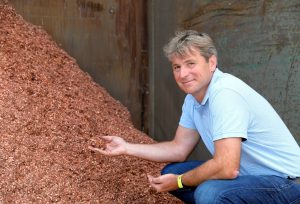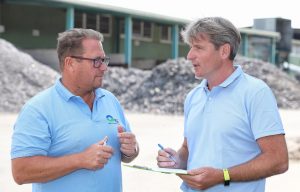 As Managing Director of Metran Rohstoff-Handels GmbH, Martin Kriegl is responsible for purchasing and sales in the MGG group of companies. Every year, he ensures that around 80,000 tons of recycled metals are delivered to buyers. In an interview he explains, among other things, why China recently turned the market upside down and why he is now travelling more than ever before.
As Managing Director of Metran Rohstoff-Handels GmbH, Martin Kriegl is responsible for purchasing and sales in the MGG group of companies. Every year, he ensures that around 80,000 tons of recycled metals are delivered to buyers. In an interview he explains, among other things, why China recently turned the market upside down and why he is now travelling more than ever before.
Mr Kriegl, your entry into Müller-Guttenbrunn was somewhat unorthodox, if you will…
MARTIN KRIEGL: Yes, I applied to Müller-Guttenbrunn in 1995 because I thought I would be able to finish my studies quickly. But that wasn’t the case because my professor didn’t agree at all with my diploma thesis. So I started at Müller-Guttenbrunn to write my thesis about a company relevant topic. In addition, I immediately started to get a taste of the scrap business. The diploma thesis and a bit of scrap metal trading finally turned into a permanent position.
How has your area of responsibility changed?
KRIEGL: My tasks have changed almost constantly. Right from the start I did a lot of PR work – suddenly the idea came up that I should take care of the company newspaper and brochures. It was mistakenly assumed that I learned this in my journalism studies. However, my studies at that time consisted of a lot of theory without any practice – so I actually had no idea. But I jumped in the cold water and worked together with Fritz Stummer from Waidhofen on the first company newspapers. Over the years, the scrap trade has become more and more important and the PR work less and less, until I finally gave it up. In the meantime, however, a number of other things have stuck with me.
Like what?
KRIEGL: I was allowed to set up the first ISO quality and environmental management systems. I even completed a radiation protection course. Much of what nobody has wanted to do over the years has somehow ended up with me.
 In the end, you focused on purchasing and sales. This area is particularly important for recycling companies – and a bit contrary to producing companies and service providers…
In the end, you focused on purchasing and sales. This area is particularly important for recycling companies – and a bit contrary to producing companies and service providers…
KRIEGL: Purchasing and sales are of course decisive factors for MGG. If we buy too dearly and sell too cheaply, the bottom line can of course not be good. Like typical sales representatives, our buyers go from door to door – in this case to scrap dealers and industrial companies – to offer our services there: We take your scrap, your waste from you. We set up a container for you and pick it up. We offer you disposal security, because we have all the permits for proper disposal – and ideally we even offer you money for it, because the waste is ultimately valuable. We are in fierce competition with other companies offering similar services.
 But the sale of recycled materials is even tougher at the moment. Why is it so hard to sell aluminium, copper, brass and other valuable raw materials?
But the sale of recycled materials is even tougher at the moment. Why is it so hard to sell aluminium, copper, brass and other valuable raw materials?
KRIEGL: Until two years ago, the demand for the recovered metals was indeed high. Since China closed down the market two years ago and no longer imports anything, everything has changed. China has ceased to be a huge market and so we have a surplus of raw materials in Europe. In addition, there is more material coming from America, because it is not anymore possible to export from the USA to China either. That’s why the buyers are currently dictating the conditions – quality and price. We recyclers have to queue up and negotiate well. I’ve been in this industry for 24 years now, but I’ve never travelled as much as I have in recent months!
So, personal contact is the be-all and end-all here?
KRIEGL: Face-to-face is of course much easier than over the phone – especially since the contract is often very complicated. Over the years I have built up a broad network. Real friendships have developed with some buyers and sellers because they talk about the same topics and even share the same hobbies. It can happen that you discuss a lot of private matters at meetings, but of course business is never neglected. Since I generally enjoy being in contact with people, I really enjoy this work – sharing high level humour and jokes and doing business at the same time. The typical Austrian humour, which is appreciated abroad, certainly helps me here.
Isn’t there already a lot of business being transacted via digital platforms these days?
KRIEGL: Yes, the old scrap dealers become fewer and fewer over time. The young generation prefers to do purchasing and sales transactions via apps, where you log in, set quantities and prices and order with a click. That works partly, partly however also not – brass is not equal to brass and copper is not equal to copper. What counts above all is quality – and often not the best price. In the industry it is said: A business is only finished when the quality of the material has been confirmed and the money has been transferred. In personal contact you can talk your way out of many things, make compromises and find solutions. If only more computer systems are used, these social contacts are lost and I don’t know if this can be the last resort.
So complaints are probably also part of your task portfolio?
KRIEGL: Yes, of course they also come to me. It is equally important to inquire about quality issues as compared to the accounting department contacting me because a customer has not yet paid. In general, there are numerous other tasks on the to-do list. For example, I coordinate the two warehouses in Amstetten and Kematen with the production managers so that the right quantities of materials of the right quality finally reach the customer. For this purpose, an inventory has to be made every month and sometimes detective like work is required if something is wrong. Fortunately, with Astrid Rametsteiner, I now have a lot of help in the back office, as she takes a lot of work over from me.
With so many different activities and tasks over the years, you have certainly learned a lot personally. What were the most valuable lessons?
KRIEGL: The most important thing is not to take yourself too seriously and not to take business personally. For example, when it comes to complaints – I’m not angry about it. I strictly separate acquaintances and friendships from business. I haven’t done business with some of my friends in the industry for years because the conditions simply don’t fit. Nevertheless, we can look each other in the eye. A further point is the adherence to contracts. We at Müller-Guttenbrunn fulfil concluded contracts – even if mistakes have occurred and the contract is disadvantageous for us. Our partners appreciate this loyalty very much because they know that you can rely on Müller-Guttenbrunn. Of course, I must also mention that I have learned that you have to be careful who you sell to. Especially in phases where you’re more or less forced to close a deal and take a risk, I’ve already learned the hard way. Personally, I have learned over the years that it is important to go on holiday for longer than 10 days, to switch off and to enjoy the days with the family. The colleagues in the office take care of the most important things. However, I have to admit that I want to know what’s going on even when I’m on holiday and therefore look at my mobile phone at least once a day to see what’s new.
Apropos new things: What are the current challenges for the company?
Kriegl: On the one hand, of course, the fact that we are currently dealing with a buyer’s market in the sector for recycled raw materials. For this reason, the material has to be separated more and more precisely according to the type of material involved. The quality requirements are becoming ever higher and these quality requirements are often almost impossible to meet. For many materials such as copper but also iron there are real penalty catalogues. Already some percentages and sometimes even per mille quantities of chrome, bismuth or antimony and the product is worth much less – or even has to go back. Another challenge is the lithium-ion batteries, which are now used almost everywhere. Again and again we hear that another recycling plant is burning down in Europe. The fact that you don’t yet know what to do with the batteries in the electric cars fits in well with this. Currently there is not a single shredder plant in Austria that takes over and recycles electric cars. This is still an unresolved story – but MGG as a family business is known for its innovations. Who knows, maybe we will find a solution in the near future.
As you can see, there is always a lot to do in the recycling industry. Therefore, we wish you much fun in your work and much success!

